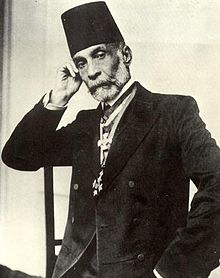Musa Kazim al-Husaini
Musa Kazim al-Husaini ( Arabic موسى كاظم الحسيني; also Musa Qasim al-Husseini ; born In Jerusalem in 1853 ; died March 27, 1934 ibid) was a high official in Ottoman Palestine . He was mayor of Jerusalem from 1918 to 1920 and is considered the first leader of the Palestinian national movement.
Life
Professional career
Musa al-Husaini came from the influential al-Husaini family , who have lived in Jerusalem since the 12th century. His father Salim al-Husaini was mayor of Jerusalem from 1882 to 1897, as was his brother Hussein al-Husaini from 1910 to 1917.
After attending a religious elementary school in Jerusalem, he was accepted at a state college for administration in Istanbul and graduated as the third best of the whole Ottoman Empire. He began his civil servant career in the Jerusalem Health Department and then became Kaymakam of Jafo , which is equivalent to a provincial governor . He then became a senior official in Safed , Yemen , Antalya , Hauran and Iraq .
Political activity
He retired before the outbreak of World War I and was appointed Mayor of Jerusalem by the British military administration under Ronald Storrs in 1918, after the death of his brother Hussein . On the occasion of the Nabi Musa riots in April 1920, he was deposed by the British after speaking out in support of the independent government of Faisal I in Damascus .
Musa al-Husaini was a leading figure in the Muslim-Christian associations that emerged from 1918. At the third Arab Congress in Haifa in December 1920 , he was elected chairman of the Arab Executive Committee and held this office until 1928. Between 1921 and 1930 he made four trips to London to express the Palestinian demands . At the first conference in London in August 1921, he spoke out in favor of the abolition of the Balfour Declaration , the abolition of Zionist immigration and the establishment of a unified and independent government in Palestine, which should enter into alliances with the surrounding Arab states. With a view to achieving Palestinian independence, he later led the fight against British proposals to convene a legislative council in Palestine, which should also include Zionist representatives.
In 1922, Musa al-Husaini led a delegation to Ankara and then to Lausanne , where the Treaty of Sèvres was to be renegotiated after Mustafa Kemal Ataturk's victory in the Greco-Turkish War . The Palestinian delegation hoped that, with Ataturk's support, the Balfour Declaration contained in the treaty would be removed from the treaty. Despite supportive pledges from Turkish officials, the original provisions for the French and British mandates in the final Lausanne Treaty remained unchanged.
By the fourth London conference in 1930, Musa al-Husaini's political influence waned noticeably. His relative, the Grand Mufti of Jerusalem Amin al-Husaini , who became a collaborator of National Socialism and promoter of anti-Semitism in the Arab region during World War II , turned against parliamentary operations and advocated more radical views. In addition, tensions arose between the al-Husaini family and the an-Naschaschibi family, also based in Jerusalem, whose representative Raghib an-Naschaschibi replaced Musa al-Husaini as mayor of Jerusalem in 1921.
On October 27, 1933, al-Husaini led a large-scale demonstration with about 10,000 participants in front of the main Mahmudiya mosque in Jafo, during which he was beaten by a British police officer; the tough police action resulted in 27 deaths. In the following days he fell ill and died on March 27, 1934. He was buried in a family grave on the Mount of Olives next to Hussein ibn Ali .
Musa's son Abd al-Qadir al-Husaini was killed in the Palestine War in 1948 .
literature
- Tom Segev : Once upon a time there was a Palestine. Jews and Arabs before the founding of the state of Israel. Siedler, Munich 2005, ISBN 3-88680-805-X . Online partial view
- Philipp Mattar: Encyclopedia of the Palestinians . Revised edition. ISBN 0-8160-5764-8 . Online partial view
Individual evidence
- ↑ Tom Segev, p. 149.
- ^ Journal of Palestine Studies 163. Volume XLI, Number 3, Spring 2012. pp. 30–31.
| personal data | |
|---|---|
| SURNAME | Husaini, Musa Kazim al- |
| ALTERNATIVE NAMES | موسى كاظم الحسيني (Arabic); Husayni, Musa Kazim al-; al-Husseini, Musa Qasim |
| BRIEF DESCRIPTION | Senior Ottoman Official, Mayor of Jerusalem |
| DATE OF BIRTH | 1853 |
| PLACE OF BIRTH | Jerusalem |
| DATE OF DEATH | March 27, 1934 |
| Place of death | Jerusalem |
